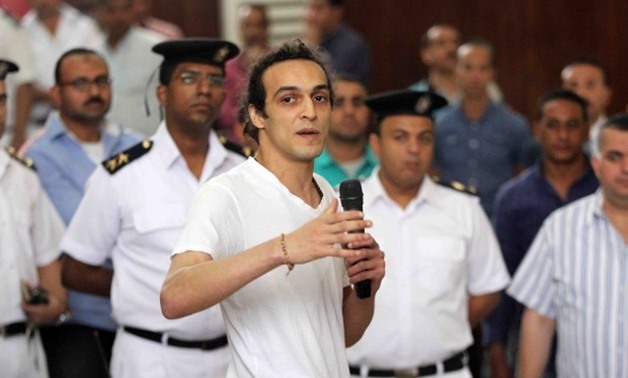
Photojournalist Shawkan Addresses Court May 21, Telling Judge Hassan Farid That He Was Arrested While Doing His Job In Covering The 2013 Police Dispersal Of The Pro-Brotherhood Rabaa Sit-In. Photo By Hassan Mohamed/Youm7.
CAIRO – 23 April 2018: Egypt’s Foreign Ministry has expressed its regret over being informed of UNESCO’s intention to grant detained photojournalist Mahmoud Abu Zeid, known as “Shawkan” an international award for press freedom.
Shawkan has been in detention for more than four years, since he was arrested in August 2013 while covering the dispersal of a pro-Brotherhood sit-in in Rabaa el-Adawiya. Along with two foreign journalists, Shawkan was incarcerated, and accused of terror-related charges; the two foreign journalists were released later.
According to a Sunday statement, the Ministry of Foreign Affairs assigned Egypt’s Permanent Representative in the UNESCO to submit a complete file including the charges drawn against Shawkan to the international organization.
“These charges are purely of criminal nature, and they are not related to freedom of press and expression,” said the statement. The ministry added that “Shawkan’s nomination for the award was motivated by a number of non-governmental organizations, including ones driven by Qatar that is known for their support of the Muslim Brotherhood terror group.”
Ahmed Abu Zeid, the ministry’s spokesperson, said that “it is inconceivable or acceptable for the UNESCO to be trapped in politicization, nepotism, and being involved in the agenda of certain countries.”
Freelance photojournalist Shawkan, 31, is currently one of 739 defendants accused of a list of charges, including: launching arson attacks on public utilities, resisting authorities, possessing unlicensed weapons, blocking roads, premeditated murder and organizing an armed gathering in Rabaa Square.
He is standing trial with 366 defendants, who are present at court, including members of the banned Muslim Brotherhood group: Mohamed Badie, Mohamed el-Beltagy and Essam el-Erian, in the case known as the “Dispersal of Rabaa sit-in.”
Last month, the prosecutor recommended a death sentence to all defendants in the case. However, lawyer Karim Abdel Rady assured “there was no evidence against Shawkan to prove he was involved in any violent act, and that he was on assignment to cover the dispersal like any other journalist,” in previous statements to Egypt Today.
His long detention has been repeatedly slammed by international press institutions and human rights organizations, who called for his immediate release for his deteriorating health condition.
Reporters Without Borders has launched a campaign last week in support of Shawkan’s release, in which many journalists from around the world took part.
On Sunday, the Photojournalists Department at the Press Syndicate in Egypt affirmed its “full support and trust in Shawkan’s innocence,” adding that there are documents proving his coverage assignment, in addition to his fellow testimonies that he only had his camera then.
President Abdel Fatah al-Sisi has repeatedly denied presence of political prisoners in Egypt, ensuring “real judicial procedures are taken into account in accordance with Egyptian law,” in an interview with France 24 in October 2017.
Three batches including hundreds of prisoners were pardoned per presidential decrees over the past two years; a fourth batch is expected to be announced soon.
In October 2016, President Sisi announced the forming of a presidential pardon committee to examine prisoners’ cases and determine who deserve a pardon in order to be released.


Comments
Leave a Comment